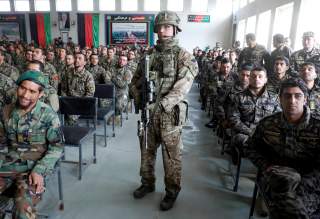An Afghan Major General's Strategy for Securing Afghanistan
In a culture that prizes honor and justice, an Afghan reconciliation will take time and a move to secure a final political settlement risks exacerbating rather than diffusing hostility.
At this stage—with a pattern of trust established and development underway—Afghans will be ready to tackle negotiations on a political settlement. It is impossible to know what it will look like, though it will need to reflect the diverse and decentralized nature of the country and the tribal and religious culture of its inhabitants. A peace deal forged by Afghans through this process—settled domestically, with benefits broadly shared—can succeed where top-down efforts by external actors have failed.
The Price of Peace; The Cost of Withdrawal
To bring this about, the United States must make a serious commitment, though not an unlimited one. This model succeeded in Northern Ireland, where the move from an Irish Republican Army ceasefire to the signing of the historic Good Friday Agreement took four years. The similarity of these two conflicts—community-based violence; a flawed peace program pursued by a Western power; the role of a neighboring, kindred state in supporting the insurgency—suggests that moving from initial Taliban negotiations towards a final settlement over four years is not unrealistic. America will need to maintain current troop levels for at least the first two years to prevent backsliding and foreclose the Taliban’s militant strategy, but once trust building efforts have begun to bear fruit, the United States could transition to an over-the-horizon posture based on air power with a reduced ground presence, phasing out its forces over two more years. Part of this will involve making constructive investments, likely on the order of $60 billion dollars over the four-year period. There is no reason for the United States to shoulder the economic burden alone, however, and cost-sharing can be one basis for international cooperation. Further, this assistance can be in the form of bona fide investments, with American investors securing opportunities in infrastructure, minerals and energy. America again is being asked to work for the benefit of the world, but the promise of success is real and America too can share in the benefits of victory.
After seventeen years of bloodshed and sacrifice, America may be tempted to withdraw prematurely, but the consequences of that choice would be dire. It would amount to a repeat of the mistake made after the Soviet withdrawal, leading to more bloodshed and instability. Already foreign powers—American rivals such as China, Russia and Iran—are seeking influence, some through sponsoring the Taliban insurgency. Leaving without a political settlement in place would also embolden other terrorist groups, showing that it's possible to wait out the United States, and creating a new safe haven for anti-American extremists, with ISIS already attempting to establish a presence. Under those conditions, the stage would be set for another 9/11.
The social engagement necessary to create a stable and pro-American Afghanistan will not be easy—it’s an effort which eluded Presidents Bush and Obama. It will require sacrifice. Already many Afghans—including some of our country’s finest leaders—have paid for supporting America with their lives. But a successful conclusion to America’s effort is still possible, and it would represent a world-historical legacy for America and for President Trump’s foreign policy.
Masood Ahmad Azizi is an experienced and effective strategic security leader committed to working in partnership across tribal, ethnic and national borders to realize the full potential of Afghanistan and the Afghan people. He was the youngest and longest-serving deputy minister in the Interior Ministry, holding the rank of major general. In that role, he acted as a proponent of strong reform within Afghan Security Institutions. Follow him on Twitter @masoodaazizi.
Image: Reuters

